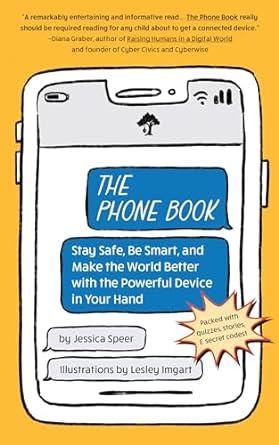The following is a contributed post from Jessica Speer, author of The Phone Book – Stay Safe, Be Smart, and Make the World Better with the Powerful Device in Your Hand.
If the hours your preteen or teen spends hunched over their phone fuels family conflict, you are not alone. Over the past decade, the daily rhythm of teen life has shifted online, sparking debate and concern from parents, schools, researchers, and others. Over 95% of teenagers have access to a smartphone, and 35% report using at least one of the top social media platforms “almost constantly.” Some screen hours are positive, prosocial, and productive, and others are not.
Recently, the US Surgeon General recommended more restrictions on social media, including warning labels, since platforms can contribute to mental health issues in young people. The Anxious Generation by Psychologist Jonathan Haidt soared to the top of the bestsellers list, arguing that screens and social media are directly linked to the epidemic of anxiety and depression among youth. A group of 41 U.S. states filed a lawsuit against Meta, the parenting company of Instagram, Facebook, WhatsApp, and Messenger, contending that the company utilizes features that cause kids and teens to use their platforms compulsively.
Society is slowly figuring out how to course-correct some of tech’s negative impacts on kids and teens, but for many families, these efforts are too late. Without meaningful regulations and safeguards, the responsibility of helping kids develop healthy tech habits falls squarely on the shoulders of parents and caregivers. This is no easy task, given that phones and apps are designed to keep kids scrolling and are the primary way teens connect.
So what can parents do to keep the peace at home and help kids and teens build healthy screen habits?
6 Things Parents Can Do to Establish Healthy Phone Habits with their Teens
1. Understand the tough spot teens are in.
Kids and teens didn’t invent cell phones, YouTube, or social media. They just happen to be growing up when the digital age shifted into high gear. It makes perfect sense that preteens and teens are drawn to phones. Through phones, they connect with peers, stay on top of trends, seek and find validation, explore their identity, and find entertainment. It’s not their fault that online spaces were designed without regard to their wellbeing. As society figures out how to make the digital world better and safer for youth, today’s kids and teens are caught in the crossfire. Find empathy for your preteen or teen as you discuss screen time and set boundaries.
2. Know that it’s okay to reset family tech rules.
If phone usage negatively impacts your teen’s well-being, sleep, and life, it’s okay to reset your family rules. Calmly share your concerns. Ask your preteen or teen what changes are doable and try to find a compromise. Maybe this means less time on the phone, fewer platforms, or communal charging stations at night. Be clear and consistent about family rules, and comply with the rules yourself. The American Academy of Pediatrics offers a free tool to help families build a media plan if they do not yet have one. Many sample phone agreements are available online to get you started, too.
Related: The Most Important Reason Teens Should Not Have Their Phones At Night
3. Acknowledge the positives of tech—not just the bad stuff.
Technology impacts our lives in positive, neutral, and negative ways. As parents, it’s easy to focus only on the negatives. Discuss tech’s benefits and drawbacks in everyday conversations with your teen, and be honest about your experiences. For example, you might share: “I notice I have the urge to look at my phone a lot” or “I don’t know how I ever managed road trips without Google Maps.” These conversations open the door to sharing how to navigate life in the digital age.
4. Have regular conversations about healthy tech habits and staying safe online.
Topics such as cyberbullying, online hate, privacy, comparison, explicit content, FOMO, disinformation, and more should be regularly discussed with adolescents. These conversations can be prompted by shared experiences, such as watching a show together or reading news headlines. Approach these discussions with curiosity, not judgment. For instance, you might say, “I just read this article about how a teen was cyberbullied on social media (then share details). How do you think teens in your school would deal with this? What are their options?” Your teen may not always be willing to engage in these conversations, but as a parent, it’s important to keep sharing, asking, and showing interest in their online world.
5. Help your preteen understand the tech business model.
Like many corporations, tech companies aim to expand their reach and profits, which means teen tech use makes them money. And advertising and data collection are critical to achieving these goals. Social media, video games, YouTube, and other apps need eyes on their platforms, including kids’ eyes, to maximize profits. Conversations about the tech business model help kids and teens become more informed tech consumers. For example, you might share, “I’ve noticed that when I search for a product online, that product magically starts appearing in my feeds and other places. It looks like my search data has been shared. Have you noticed this happening to you, too?”
6. Remind teens to curate their feeds.
Social media networks and sites like YouTube use algorithms to feed us content. One downside of algorithms is that they can drop teens into a rabbit hole of harmful content, such as disordered eating, body dissatisfaction, and hate-based messages. To safeguard against this, remind teens that they can curate their feed in a way that positively impacts their well-being and self-esteem. For example, they can follow inspiring people who are making positive changes in the world rather than people who make them feel bad about themselves. Here are some conversation starters: “What social media platform do you think has the best algorithm? Why do you think it is so good? Has your feed ever gone in a direction you didn’t want it to?”
Related: How to Help Tweens and Teens Manage Unwanted Sexual Content Online
Parenting in the digital age is complicated. This inspired me to write The Phone Book – Stay Safe, Be Smart, and Make the World Better with the Powerful Device in Your Hand for preteens and early teens. As digital natives, kids and teens are tech-savvy but need help and support navigating the complexities and dangers of life online. Honest ongoing conversations, clear rules, and a lot of empathy and curiosity will help smooth out the ride as you find the best path for your family.
Looking for help as you navigate parenting in the digital age?
Check out The Phone Book – Stay Safe, Be Smart, and Make the World Better with the Powerful Device in Your Hand by Jessica Speer. The Phone Book is packed with research-based explanations, techy tidbits, and real stories from hundreds of teens and preteens, this phone book (the fun kind) will be your guide on the path of light, teaching you healthy phone habits and ways to stay safe online.

Parenting teens is a tough job, but you’re not alone. These posts might help:
This Is One Of The Most Important Conversations You Can Have With Your Teen Son
This Is Why Teen Girls Are So Mean to Their Mothers
The Best Netflix Shows for Tweens and Teens Families Can Enjoy Together
10 Commons Battles that Will Destroy the Relationship with Your Teen
*This post may contain affiliate links where we earn a small commission for purchases made from our site.






Leave a Comment